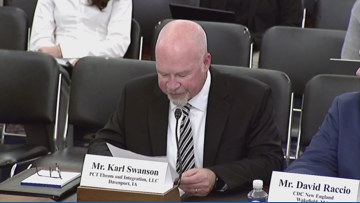Institutional Accreditation and Commitment to Sustainable Development Goals
A recent institutional review has affirmed that Muskegon Community College (MCC) meets the highest standards of educational excellence. The Higher Learning Commission (HLC), a regional accreditation agency, has reaffirmed MCC’s accreditation with its highest possible rating. This achievement directly reflects the college’s profound commitment to fulfilling key United Nations Sustainable Development Goals (SDGs), particularly SDG 4 (Quality Education).
Higher Learning Commission (HLC) Review Findings
The formal notification was issued following the HLC’s Open Pathway Assurance Review, a comprehensive analysis conducted in the fourth year of a ten-year accreditation cycle. The review is designed to ensure institutions maintain adherence to established educational criteria. Key findings from the report include:
- Muskegon Community College fully met all HLC “criteria for accreditation.”
- The HLC review team did not identify any areas requiring further monitoring or follow-up reporting.
- This outcome represents the highest level of reaffirmation an institution can receive during a mid-cycle review.
Aligning Educational Excellence with SDG 4: Quality Education
The HLC’s validation serves as a critical benchmark of MCC’s success in providing inclusive, equitable, and high-quality education. By meeting these rigorous external standards, the college demonstrates its dedication to fostering lifelong learning opportunities for its community. This commitment is not recent; MCC has maintained its accredited status since 1926, illustrating a long-term institutional focus on the principles outlined in SDG 4.
Contribution to Economic and Social Development
MCC’s academic structure and program offerings are strategically designed to support broader socioeconomic goals, including sustainable economic growth and the reduction of societal inequalities.
Fostering Decent Work and Economic Growth (SDG 8)
The college offers over 80 academic programs, including 49 associate degrees and 33 certificate options, which are organized into pathways that align with regional workforce needs. These programs directly support SDG 8 by equipping students with the skills necessary for productive employment and decent work, thereby contributing to sustained and inclusive economic growth. The six designated career pathways are:
- Arts, Humanities & Communication
- Business & Information Technology
- Engineering/Manufacturing & Industrial Technology
- Health Services
- Human Services
- Math & Science
Promoting Inclusivity and Reducing Inequalities (SDG 10)
As a community college, MCC plays a vital role in advancing SDG 10 by providing accessible and affordable post-secondary education. This access empowers a diverse student body, reduces financial and social barriers to higher learning, and provides clear pathways to economic mobility, which is fundamental to reducing inequality within and among communities.
Future Outlook and Strategic Partnerships
The successful accreditation review positions MCC to continue its mission with a confirmed foundation of quality and institutional effectiveness.
Sustained Commitment and Future Evaluation
The college’s next comprehensive evaluation by the Higher Learning Commission is scheduled for the 2030-2031 academic year. This long-term evaluation cycle ensures a sustained focus on continuous improvement and accountability.
Partnerships for the Goals (SDG 17)
The relationship between Muskegon Community College and the Higher Learning Commission exemplifies SDG 17. This robust partnership for quality assurance strengthens the institution, ensuring its educational programs effectively serve students and the broader community. Such collaborations are essential for building the institutional capacity required to achieve all other sustainable development objectives.
SDGs Addressed in the Article
-
SDG 4: Quality Education
The entire article is centered on the theme of quality education. It discusses Muskegon Community College (MCC) receiving the “highest rating possible” from the Higher Learning Commission (HLC), a regional accreditation agency. This accreditation process is a formal evaluation of the quality of education provided by the institution. The article emphasizes MCC’s “commitment to the success of its students” and its provision of “top-quality educational experiences,” which directly aligns with the core mission of SDG 4.
Specific SDG Targets Identified
-
Target 4.3: By 2030, ensure equal access for all women and men to affordable and quality technical, vocational and tertiary education, including university.
The article directly relates to this target by focusing on a community college, which is a key provider of tertiary and vocational education. The reaffirmation of accreditation by the HLC, with the college meeting all “criteria for accreditation,” serves as a testament to the quality of the education offered. Furthermore, the article mentions that MCC offers “over 80 academic programs, including 49 associate degree paths and 33 certificate options,” demonstrating the provision of diverse and accessible technical, vocational, and tertiary programs.
-
Target 4.4: By 2030, substantially increase the number of youth and adults who have relevant skills, including technical and vocational skills, for employment, decent jobs and entrepreneurship.
This target is addressed through the description of MCC’s academic offerings. The article states that the college’s programs are organized into “six career pathways,” which include practical, job-oriented fields like “Business & Information Technology; Engineering/Manufacturing & Industrial Technology; Health Services; and Human Services.” This structure is explicitly designed to equip students with relevant skills for the workforce, directly contributing to the goal of increasing the number of adults with skills for employment.
Indicators for Measuring Progress
-
Implied Indicator for Target 4.3: Institutional Accreditation Status and Program Diversity
While the article does not mention a formal UN indicator, it provides clear, measurable data that can function as indicators of quality and access. The primary indicator is the accreditation status itself—receiving “reaffirmation of accreditation with no required follow-up reporting” is a qualitative and quantitative measure of institutional quality. A second indicator is the number and variety of programs offered (“over 80 academic programs,” “49 associate degree paths,” “33 certificate options”), which measures the extent of access to different forms of tertiary and vocational education.
-
Implied Indicator for Target 4.4: Provision of Career-Focused Educational Pathways
The article implies an indicator for progress towards Target 4.4 by highlighting that MCC’s programs are structured into “six career pathways.” The existence and categorization of these pathways (e.g., “Engineering/Manufacturing & Industrial Technology,” “Health Services”) serve as a direct indicator of the institution’s strategic effort to provide students with skills explicitly relevant to employment and specific industries.
Summary of SDGs, Targets, and Indicators
| SDGs | Targets | Indicators (Identified or Implied in the Article) |
|---|---|---|
| SDG 4: Quality Education | Target 4.3: Ensure equal access for all to affordable and quality technical, vocational and tertiary education. |
|
| SDG 4: Quality Education | Target 4.4: Substantially increase the number of youth and adults who have relevant skills for employment. |
|
Source: muskegoncc.edu







